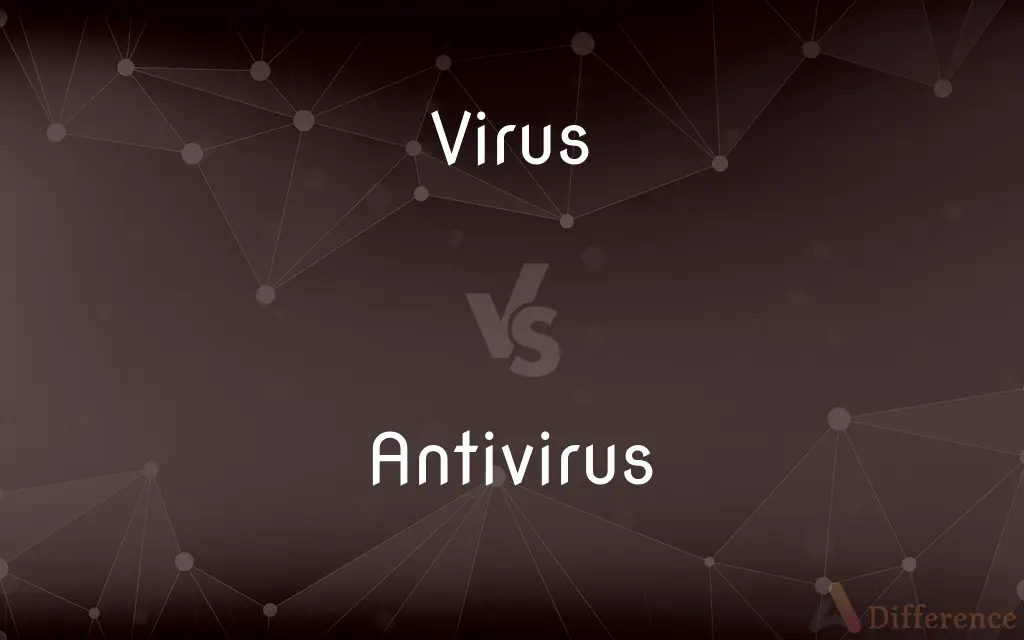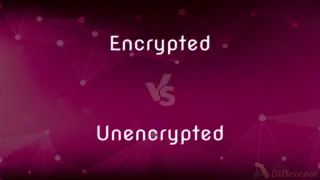Virus vs. Antivirus — What's the Difference?
By Urooj Arif & Maham Liaqat — Updated on March 21, 2024
A virus is malicious software designed to harm or exploit systems, whereas antivirus is software created to detect and eliminate viruses.

Difference Between Virus and Antivirus
Table of Contents
ADVERTISEMENT
Key Differences
A virus in the computing context refers to a type of malware that is designed to spread from one computer to another, attaching itself to legitimate software or files in the process. It can disrupt, damage, or gain unauthorized access to computer systems. Antivirus, on the other hand, is a type of software developed specifically to prevent, search for, detect, and remove viruses and other malicious software from computers and networks.
Viruses often replicate themselves and spread to other computers through various means, such as email attachments or infected software downloads. They can perform a range of malicious activities, including stealing sensitive information, corrupting data, and even taking control of the affected device. Antivirus software combats these threats by scanning files and systems for known virus signatures and behaviors, effectively identifying and neutralizing potential infections.
The development of viruses is usually driven by malicious intent, such as financial gain, espionage, or simply causing disruption. Creators of viruses exploit vulnerabilities in software and human behavior to achieve their goals. Conversely, antivirus software is developed by cybersecurity professionals aiming to protect users and systems from these malicious threats. The ongoing battle between virus creators and antivirus developers drives continuous advancements in cybersecurity technologies.
One of the key functions of antivirus software is real-time protection, which continuously monitors computer systems for suspicious activities that might indicate a virus infection. This proactive approach helps prevent viruses from causing significant damage. In contrast, the behavior of a virus is typically hidden and deceptive, making it challenging for users to detect without the aid of antivirus software.
The effectiveness of antivirus software depends on its ability to keep up with the ever-evolving landscape of malware and viruses. Regular updates are essential for antivirus programs to recognize the latest threats. On the contrary, viruses are constantly being modified and made more sophisticated by their creators to evade detection by antivirus solutions and exploit new vulnerabilities.
ADVERTISEMENT
Comparison Chart
Purpose
Designed to harm, disrupt, or unauthorizedly access systems.
Developed to detect, prevent, and remove viruses and malicious software.
Nature
Malicious software that replicates and spreads.
Protective software that scans and removes malicious threats.
Intention
Created with harmful intent, such as theft, damage, or espionage.
Designed to safeguard computer systems and data from malware.
Operation
Often works by attaching to legitimate files and spreading.
Operates by scanning for and eliminating threats based on signatures and behaviors.
User Impact
Can lead to data loss, privacy breaches, and system damage.
Aims to protect user data, ensure privacy, and maintain system integrity.
Compare with Definitions
Virus
Malicious Software.
The virus infected the computer through a downloaded email attachment.
Antivirus
Detects and Removes Malware.
Regular scans by the antivirus help keep the system free from malware.
Virus
Self-Replicating.
Once activated, the virus replicated itself and spread to other files.
Antivirus
Protective Software.
The antivirus software detected and removed the malicious file before it could cause harm.
Virus
Exploits Vulnerabilities.
The virus exploited a security flaw in the operating system to infect the computer.
Antivirus
Updates to Combat New Threats.
The antivirus received an update to protect against the latest malware.
Virus
Damages Systems.
The virus caused significant data corruption on the affected machine.
Antivirus
Real-Time Protection.
The antivirus software provides real-time protection by continuously monitoring system activities.
Virus
Unauthorized Access.
The virus allowed hackers to gain unauthorized access to sensitive information.
Antivirus
Prevents Infections.
The antivirus blocked the download of a file that contained a known virus.
Virus
A virus is a submicroscopic infectious agent that replicates only inside the living cells of an organism. Viruses infect all life forms, from animals and plants to microorganisms, including bacteria and archaea.
Antivirus
Of or relating to a software program designed to identify and remove known or potential computer viruses.
Virus
Any of various submicroscopic agents that infect living organisms, often causing disease, and that consist of a single or double strand of RNA or DNA surrounded by a protein coat. Unable to replicate without a host cell, viruses are typically not considered living organisms.
Antivirus
(computing) A piece of software that is used to detect, delete and or neutralize computer-based viruses.
Virus
A disease caused by a virus.
Virus
A computer program or series of commands that can replicate itself and that spreads by inserting copies of itself into other files or programs which users later transfer to other computers. Viruses usually have a harmful effect, as in erasing all the data on a disk.
Virus
A harmful or destructive influence
The pernicious virus of racism.
Virus
A submicroscopic, non-cellular structure consisting of a core of DNA or RNA surrounded by a protein coat, that requires a living host cell to replicate, and often causes disease in the host organism; such agents are often classed as nonliving infectious particles and less often as microorganisms.
Virus
(uncountable) A quantity of such infectious agents
Virus
A disease caused by such an infectious agent; a viral illness.
He's got a virus and had to stay home from school.
Virus
(archaic) Venom, as produced by a poisonous animal etc.
Virus
(computing) A type of malware which can covertly transmit itself between computers via networks (especially the Internet) or removable storage such as disks, often causing damage to systems and data; also computer virus.
Virus
Any type of malware.
Virus
(figurative) Any malicious or dangerous entity that spreads from one place or person to another.
Virus
To send or infect an electronic device with a computer virus.
I'm just going to virus anyone who tries cheating on this game.
Virus
Contagious or poisonous matter, as of specific ulcers, the bite of snakes, etc.; - applied to organic poisons.
Virus
The causative agent of a disease, .
Virus
Any of numerous submicroscopic complex organic objects which have genetic material and may be considered as living organisms but have no proper cell membrane, and thus cannot by themselves perform metabolic processes, requiring entry into a host cell in order to multiply. The simplest viruses have no lipid envelope and may be considered as complex aggregates of molecules, sometimes only a nucleic acid (DNA or RNA) and a coat protein. They are sometimes viewed as being on the borderline between living and nonliving objects. They are smaller than living cells in size, usually between 20 and 300 nm; thus they pass through standard filters, and were previously referred to as filterable virus. The manifestations of disease caused by multiplication of viruses in cells may be due to destruction of the cells caused by subversion of the cellular metabolic processes by the virus, or by synthesis of a virus-specific toxin. Viruses may infect animals, plants, or microorganisms; those infecting bacteria are also called bacteriophages. Certain bacteriophages may be non-destructive and benign in the host; - see bacteriophage.
Virus
Fig.: Any morbid corrupting quality in intellectual or moral conditions; something that poisons the mind or the soul; as, the virus of obscene books.
Virus
A program or segment of program code that may make copies of itself (replicate), attach itself to other programs, and perform unwanted actions within a computer; also called computer virus or virus program. Such programs are almost always introduced into a computer without the knowledge or assent of its owner, and are often malicious, causing destructive actions such as erasing data on disk, but sometime only annoying, causing peculiar objects to appear on the display. The form of sociopathic mental disease that causes a programmer to write such a program has not yet been given a name. Compare trojan horse{3}.
Virus
(virology) ultramicroscopic infectious agent that replicates itself only within cells of living hosts; many are pathogenic; a piece of nucleic acid (DNA or RNA) wrapped in a thin coat of protein
Virus
A harmful or corrupting agency;
Bigotry is a virus that must not be allowed to spread
The virus of jealousy is latent in everyone
Virus
A software program capable of reproducing itself and usually capable of causing great harm to files or other programs on the same computer;
A true virus cannot spread to another computer without human assistance
Common Curiosities
How often should antivirus software be updated?
Antivirus software should be updated regularly to protect against the latest threats and vulnerabilities.
Can a virus spread without user interaction?
Yes, some viruses can replicate and spread automatically to other systems or files without direct user action.
Can a virus infect a device without an internet connection?
Yes, viruses can spread through removable media like USB drives, even if the device is not connected to the internet.
Can antivirus software detect all types of viruses?
While antivirus software strives to detect all known viruses, new and sophisticated viruses might evade detection until the antivirus is updated.
What is real-time protection in antivirus software?
Real-time protection is a feature of antivirus software that continuously monitors and protects the system from threats as they occur.
How does antivirus software protect a computer?
Antivirus software detects, prevents, and removes viruses and other malicious software by scanning files and monitoring system activities.
Is antivirus software necessary for all devices?
Yes, any device that can connect to the internet or transfer data with other devices should have antivirus protection.
What makes a virus different from other types of malware?
Viruses are unique in their ability to attach themselves to legitimate files and self-replicate, spreading to other files and systems.
What is the primary purpose of a virus?
A virus aims to harm, disrupt, or gain unauthorized access to computer systems and data.
What happens if a virus infects a computer?
A virus can cause various issues, including data loss, privacy breaches, system malfunction, and unauthorized access to sensitive information.
Are free antivirus programs effective?
Free antivirus programs can provide basic protection, but paid versions typically offer more comprehensive security features and protections.
How do virus creators benefit from spreading viruses?
Virus creators can benefit through financial gain, espionage, sabotage, or by proving their technical skills.
Can antivirus software remove a virus after infection?
Yes, most antivirus software can remove a virus from an infected system, although some severe infections might require specialized tools or procedures.
How do antivirus programs detect new viruses?
Antivirus programs use various methods, including signature-based detection, heuristic analysis, and behavior monitoring, to detect new viruses.
What can users do to prevent virus infections?
Users can prevent infections by using reliable antivirus software, keeping their systems and software updated, and practicing safe browsing and email habits.
Share Your Discovery

Previous Comparison
Acetone vs. Chloroform
Next Comparison
Encrypted vs. UnencryptedAuthor Spotlight
Written by
Urooj ArifUrooj is a skilled content writer at Ask Difference, known for her exceptional ability to simplify complex topics into engaging and informative content. With a passion for research and a flair for clear, concise writing, she consistently delivers articles that resonate with our diverse audience.
Co-written by
Maham Liaqat















































